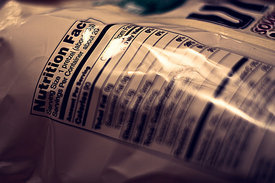Report: Chemicals Most Countries Ban Still Permitted in US Foods
Recent investigations highlight industry preference in FDA, expose frequent use of cheap and dangerous additives
Spawned by a petition calling on Gatorade to remove a flame retardant from their sports drink, the Chicago Tribune released an investigation into the chemical ingredients that the United States and the Food and Drug Administration (FDA) are permitting despite frequent bans elsewhere.
 New reports raise questions about the
validity of the back-of-the-package information. (Photo: Dan
Domme via Flickr) Mississippi 15-year-old, Sarah
Kavanagh, launched the
Change.org petition after learning that Gatorade contains an
emulsifier, brominated vegetable oil (or BVO), which is illegal
to use as a food additive in the European Union, India, Nepal,
Canada, Brazil and Japan because of its connection to
reproductive and behavior problems.
New reports raise questions about the
validity of the back-of-the-package information. (Photo: Dan
Domme via Flickr) Mississippi 15-year-old, Sarah
Kavanagh, launched the
Change.org petition after learning that Gatorade contains an
emulsifier, brominated vegetable oil (or BVO), which is illegal
to use as a food additive in the European Union, India, Nepal,
Canada, Brazil and Japan because of its connection to
reproductive and behavior problems.
"In the U.S. money rules and industry wields a lot of influence and that's how it has been for a while," said Michael Hansen, senior scientist at the Consumers Union, "but in Europe they take into serious consideration what their population wants, too. And why shouldn't the population be concerned about new things being put into food?"
Whereas other international authorities tend to err on the side of caution when it comes to evaluating food additives, in the US new food products "simply need an OK from experts hired by the manufacturers" giving the FDA the option to investigate later "if health issues emerge."
Though the FDA's mission is purportedly "to protect public health by ensuring that foods are safe and properly labeled," a second examination released Wednesday by the non-profit food watchdog, the U.S. Pharmacopeial Convention (USP), revealed that the amount of food fraud and mislabeled ingredients is up by 60 percent this year.
In comparison to their initial Food Fraud Database published in April 2012, the group found a surge in adulterated ingredients in common household products.
ABC News reports:
Among the most popular targets for unscrupulous food suppliers? Pomegranate juice, which is often diluted with grape or pear juice…additional sugar, or just water and sugar.
[Markus Lipp, senior director for Food Standards at an independent lab] added that there have also been reports of completely "synthetic pomegranate juice" that didn't contain any traces of the real juice.
USP tells ABC News that liquids and ground foods in general are the easiest to tamper with:
- Olive oil: often diluted with cheaper oils
- Lemon juice: cheapened with water and sugar
- Tea: diluted with fillers like lawn grass or fern leaves
- Spices: like paprika or saffron adulterated with dangerous food colorings that mimic the colors
Milk, honey, coffee and syrup are also listed by the USP as being highly adulterated products.
Also high on the list: seafood. The number one fake being escolar, an oily fish that can cause stomach problems, being mislabeled as white tuna or albacore, frequently found on sushi menus.
Kavanagh, whose personal dismay launched the Gatorade petition and subsequent investigation, said it "shows greed" when companies use chemical additives and cheaper ingredients that could cause health problems.
"It shows that they care less about consumers than about how much money they spend and make," she added.
Gatorade has stated that no changes are planned to its US drink formulation despite the over 200,000 signatures gathered calling for the ban.